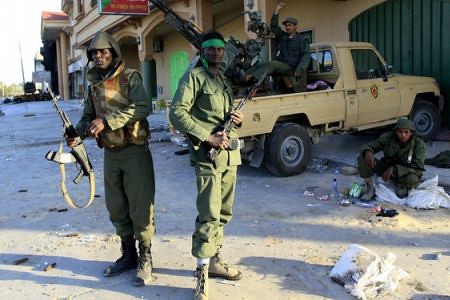
Libyan military forces stand guard amid increased bombings by the United States-led imperialist onslaught against this North African state. Since March 19 the NATO forces have killed scores of civilians and destroyed government property., a photo by Pan-African News Wire File Photos on Flickr.
Stalemate emerging in Libya war: US
Fri Apr 8, 2011 2:28AM
presstv.ir
The former commander of US-led air strikes on Libya says a deadlock appears to be emerging amid unrelenting battles between the feuding forces in the North African country.
Speaking to the Senate's Armed Services Committee on Thursday, General Carter Ham, who led the first stage of the Western alliance's aerial attacks in Libya, portrayed a grim outlook for the ongoing war, saying that a long slog lies ahead, and that cannot be resolved by military means, Reuters reported.
Some members of the committee, particularly Republicans peppered the commander of US Africa Command with tough and stinging questions regarding the use of ground troops to oust Libyan ruler Muammar Gaddafi or chances of arming the opposition forces currently fighting pro-Gaddafi forces.
Ham said a stalemate is "not the preferred solution" in Libya, but that outcome appeared "more likely" now than at the beginning of the US-led aerial strikes launched on March 19.
Asked by Senator Lindsey Graham about the denouement of the war in Libya, the top US general replied, "I think it does not end militarily." He went on to downgrade the likelihood that opposition forces could ultimately overthrow the 68-year-old Libyan strongman.
Meanwhile, the committee's senior Republican, Senator John McCain fired an acerbic broadside at President Barack Obama's decision not to use the military to directly get rid of Gaddafi.
The United States lost an opportunity to remove the Libyan ruler when it sought an international coalition and took three weeks to put it together, McCain noted.
General Ham, however, claimed that the US-led intervention had succeeded in protecting civilians for the most part in the wake of the passage of UN Security Council (UNSC) 1973, which authorized a no-fly zone over Libya and military strikes "to guard civilians."
On Thursday, a NATO airstrike killed at least five opposition forces in the eastern city of Brega, marking the second deadly NATO strike on Libyan revolutionary forces in less than a week.
Many civilians have reportedly been killed since the Western-led war on Libya began last month.
No comments:
Post a Comment